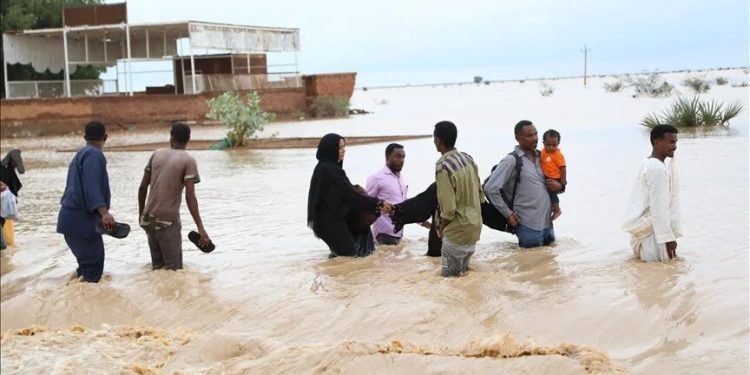CLAIM: A Facebook user, Larry Huggins has made a claim (archived) on the social media platform that climate change was not responsible for the recent flood in Sudan as against the report by the ABC News, an Australian-based television service.
He said the country had always been associated with problems of flooding and starvation of children. Rather than climate change, he argued that it was wars that moved the people in the African country to the flooded area.
“ABC News today blamed climate change for floods in Sudan. This country has always had the same problems with flooding and starving children.
“Wars have moved the people to this flooded area and climate change has nothing to do with it. ABC is trying to help Biden with his climate change hoax, because people are finally catching on to the fake climate change claim,” Huggins said in the post shared on April 10.
VERIFICATION: Flooding is an overflowing of water onto land that is normally dry. Floods can happen during heavy rains, when ocean waves come on shore, when snow melts quickly, or when dams or levees break. Damaging flooding may happen with only a few inches of water, or it may cover a house to the rooftop. Floods are the most frequent type of natural disaster.
Meanwhile, climate scientists observe that when warmer temperatures increase evaporation, they put more moisture into the atmosphere that then gets released as rain or snowfall.
As such, researchers expect that, as the climate warms, flash floods will get “flashier,” meaning that the timing of the floods will get shorter while the magnitude gets higher.
It is corroborated that climate change has undoubtedly intensified heavy precipitation events. When it comes to river floods, climate change is likely exacerbating the frequency and intensity of the extreme flood events, but decreasing the number of moderate floods, researchers found in a 2021 study published in Nature.
“As the climate warms, higher rates of evaporation cause soils to dry out more rapidly. For those moderate and more commonplace floods, the initial conditions of soil moisture is important, since drier soils may be able to absorb most of the rainfall.
“With larger flood events, that initial soil moisture matters less because there’s so much water that the soil wouldn’t be able to absorb all of it, anyway,” said Manuela Brunner, a hydrologist at the University of Freiburg in Germany and the lead author of the 2021 study.
Dr. Brunner said any additional water added past the point where the soil is fully saturated will run off and contribute to flood development.
UNICEF said floods had worsened over the past years as Sudan is suffering increasingly from the consequences of climate change.
Scientists are confident some types of flooding will increase in the “business as usual” scenario where humans continue warming the planet with greenhouse gas emissions at the current rate.
Elena Shao, a climate reporting fellow for The New York Times writes that coastal flooding will continue to increase as sea levels rise. Melting glaciers and ice sheets add volume to the ocean, and the water itself expands as it warms.
Second, she said flash flooding will continue to increase as there are more extreme precipitation events. Warmer temperatures increase evaporation, putting more moisture into the atmosphere that then gets released as rain or snowfall.
CONCLUSION: A Facebook claim that climate change was not responsible for the recent flood in Sudan is FALSE. Studies into the causes of perpetual floodings in the war-torn Sudan showed that the country had been suffering from the consequences of climate change.
This fact-check was produced by BONews Service with support from Code for Africa’s PesaCheck, International Fact-Checking Network, and African Fact Checking Alliance network.

